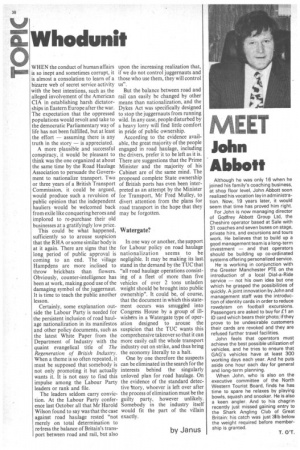Whodunit
Page 40

If you've noticed an error in this article please click here to report it so we can fix it.
WHEN the conduct of human affairs is so inept and sometimes corrupt, it is almost a consolation to learn of a bizarre web of secret service activity with the best intentions, such as the alleged involvement of the American CIA in establishing harsh dictatorships in Eastern Europe after the war. The expectation that the oppressed populations would revolt and take to the democratic Parliamentary way of life has not been fulfilled, but at least the effort — assuming there is any truth in the story — is appreciated.
A more plausible and successful conspiracy, it would be pleasant to think was the one organized at about the same time by the Road Haulage Association to persuade the Government to nationalize transport. Two or three years of a British Transport Commission, it could be argued, would produce such a revulsion of public opinion that the independent hauliers would be welcomed back from exile like conquering heroes and implored to re-purchase their old businesses at a gratifyingly low price.
This could be what happened, sufficiently so to arouse suspicion that the RH A or some similar body is at it again. There are signs that the long period of public approval is coming to an end. The village Hampdens are more inclined to throw brickbats than flowers. Obviously, counter-intelligence has been at work, making good use of the damaging symbol of the juggernaut. It is time to teach the public another lesson.
Certainly, some explanation outside the Labour Party is needed for the persistent inclusion of road haulage nationalization in its manifestos and other policy documents, such as the latest White Paper from the Department of Industry with the quaint evangelical title of The Regeneration of British Industry. When a theme is so often repeated, it must be supposed that somebody is not only promoting it but actually wants it. It is not easy to find this impulse among the Labour Party leaders or rank and file.
The leaders seldom carry conviction. At the Labour Party conference last October all that Mr Harold Wilson found to say was that the case against road haulage rested "not merely on total determination to redress the balance of Britain's transport between road and rail, but also upon the increasing realization that, if we do not control juggernauts and those who use them, they will control us".
But the balance between road and rail can easily be changed by other means than nationalization, and the Dykes Act was specifically designed to stop the juggernauts from running wild. In any case, people disturbed by a heavy lorry will find little comfort in pride of public ownership.
According to the evidence available, the great majority of the people engaged in road haulage, including the drivers, prefer it to be left as it is. There are suggestions that the Prime Minister and the majority of his Cabinet are of the same mind. The proposed complete State ownership of British ports has even been interpreted as an attempt by the Minister for Transport, Mr Fred Mulley, to divert attention from the plans for road transport in the hope that they may be forgotten.
Watergate?
In one way or another, the support for Labour policy on road haulage nationalization seems to be negligible. It may be making its last, stand in the demand by the TUC that "all road haulage operations consisting of a fleet of more than five vehicles of over 2 tons unladen weight should be brought into public ownership". It could be, of course, that the document in which this statement occurs was smuggled into Congress House by a group of illwishers in a Watergate type of operation designed to arouse the suspicion that the TUC wants this comprehensive takeover so that it can more easily call the whole transport industry out on strike, and thus bring the economy literally to a halt.
One by one therefore the suspects can be eliminated in the search for the interests behind the singularly unloved plan for road haulage. On the evidence of the standard detective story, whoever is left over after the process of elimination must be the guilty party, however unlikely. Somebody in the industry itself would fit the part of the villain exactly.
by Janus




































































































